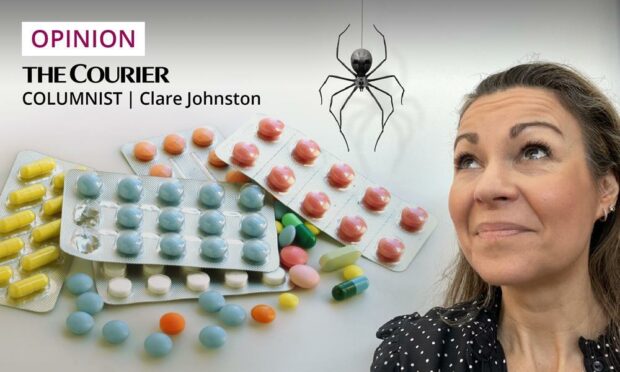At night, for brief interludes at a time, I am visited by a motley cast of characters.
It started with spiders dangling from the ceiling and has since progressed to include an old hunched man, a bent nail floating in mid-air and even the hand of God.
These nocturnal sightings are always accompanied by me shouting, broadcasting my madness to the whole house.
After shrieking at the last episode, which was slightly more mainstream – a man running towards me – my youngest son appeared at the bedroom door to ask if everything was okay.
“It’s just mum having one of her bad dreams,” my husband reassured him.
“It’s okay, I’m used to it,” my son sighed.

As troubling as this all is, I’m perhaps more relaxed than I should be because I know the cause.
It’s my hormones.
These hallucinations happen when I first fall asleep. A slight sound might disturb me and in those fleeting seconds I see a flash and call out.
But it usually coincides with another symptom, such as night sweats or palpitations.
So I know it’s linked to perimenopause.
It’s the sudden fall in oestrogen that is contributing to disrupted sleep and other unwelcome complaints.
It’s giving me a taste of what might be in store in the years ahead when I go through the real deal – though I’m hoping the night visions are a passing phase.
For now, I’m choosing to ignore these unsettling hormonal events and hope I’m one of the lucky ones who barely notices they’re experiencing menopause.
But if I do go on to develop more frequent and difficult symptoms I won’t hesitate to use hormone replacement therapy (HRT).
Moves to make HRT more easily accessible
The good news is that some forms of HRT could be made available without a prescription in the UK for the first time.
The UK medicines regulator, the MHRA, is looking at relaxing the rules around hormone therapy to offer women easier access.
It did the same with the contraceptive pill last summer.
Perimenopause is the precursor to the main event. For some, it can begin as early as their thirties, although for most it tends to start from their mid-forties.
You officially reach menopause after a year of going without a menstrual period, which generally happens by the age of 55.
What happens in between – and the extent to which women are affected – will vary wildly.
But for some it can be an utterly miserable experience in the absence of treatment.
Celebrities speak up
Countless high-profile women have stepped up in recent times to share their experiences and help break down the stigma which leaves so many women feeling like they can’t be open about the symptoms they’re experiencing.
That means they can be sitting in a work meeting and suddenly flush bright red, break out in a sweat, lose their train of thought or feel overwhelmed with emotion.
And those are just a few of the issues.
Many try to cover it up and struggle on, while their colleagues sit either baffled or blissfully unaware.
The Shift podcast is back! And a massive thank you to my first guest, @NicolaSturgeon – honest, outspoken, human (and not just “for a politician”) she goes there on menopause, being a woman in power, self doubt and so much more. https://t.co/tPocmV9xQC pic.twitter.com/a1WxI48CuP
— Sam Baker (@SamBaker) January 25, 2022
Nicola Sturgeon recently admitted in a podcast appearance that, while she feels she has a responsibility to talk about menopause, she “is so far out of her comfort zone”.
That alone tells her “we still have a long way to go” when it comes to speaking up and breaking the stigma around ‘the change’.
But there is no need to suffer in silence anymore.
HRT now proven to be a safe treatment
My sister began experiencing extreme fatigue and low mood a few years ago, along with irregular periods.
She pieced together that the three were interlinked. And, being a nurse, she immediately went to the doctor and asked if she could go on HRT.
She started using patches and within a couple of weeks the difference was night and day.
It wasn’t until she waved the magic wand that she realised how bad things had become.
Conflicting studies over the years put many women off HRT after it was linked with a higher risk of breast cancer and even dementia.
More recent studies have concluded there aren’t significant health risks related to taking the therapy, particularly oestrogen-only HRT.
It could also have long term benefits, including reducing the risk of heart disease, type 2 diabetes and osteoporosis.
That’s provided patients start within 10 years of menopause onset.
And that’s why, at 48, HRT will be my first port of call if my nocturnal visitors become more regular, or I start to notice other signs and symptoms that are affecting my quality of life.
My poor son might even get used to quieter nights again.












